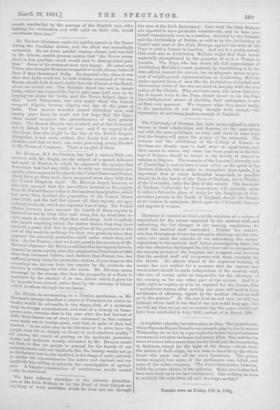Mr. Hermon, M.P. for Preston, has had a curious little
con- troversy with Mr. Bright, on the subject of a speech delivered last week in Preston, in which he expressed the opinion that Free-trade had had very little to do with our commercial pro- sperity, since, measured by exports, the United States and France, which have no Free-trade, have prospered more since 1818 than the United Kingdom itself. Mr. Hermon forgot, however, to take into account that the marvellous increase in the exports from the United States is due to the immense immigration, which has more than doubled the population of the United States since 1818, and the fact that almost all their exports are agri- cultural products, which are exported free of duty. The United States, however, must measure the benefit of these exports to themselves not by what they send away, but by what they re- seive again in return for what Choy send away. And everybody who knows anything about the matter knows that they have received a great deal less in proportion of the products of the rest of the world iu exchange for their own products since they imposed the absurdly protective tariff under which they now live. As for France,—and we doubt greatly the accuracy of Mr. Hormon's figures,—Mr. Hermon will find that her exports have in- -creased far more rapidly since the comparative Free-trade of 1860 than they increased before ; and further, that France, too, has -suffered greatly from her protective system, if you measure the .advantage she derives from her exports by the products she receives in exchange for what she sends. Mr. Hermon seems .possessed by the strange idea that the prosperity of a State is measured by the amount of its own labour which it gives for its imports from abroad, rather than by the economy of labour .which it effects through the exchange.


































 Previous page
Previous page